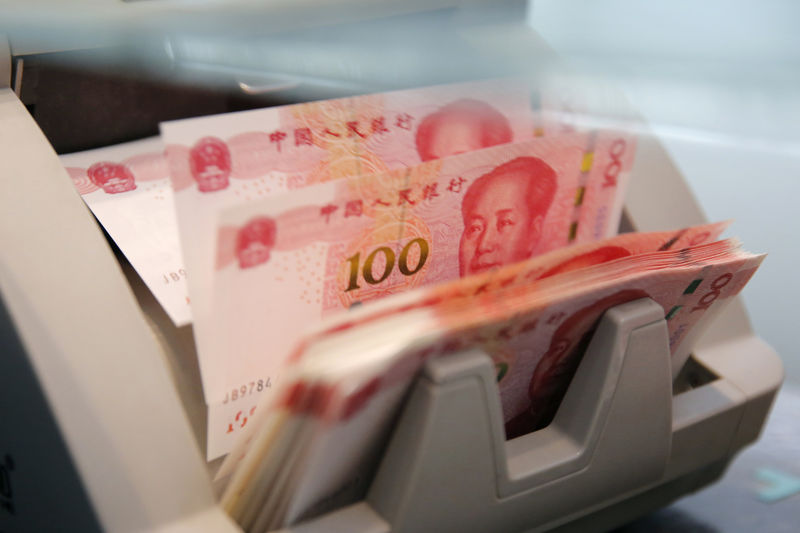By Pete Sweeney and Jennifer Ablan
SHANGHAI/NEW YORK (Reuters) - China's central bank has driven off foreign yuan bears with a combination of intervention, regulation and more than a little help from a shift in the U.S. Federal Reserve's stance, capping risky outflows and buying time to stimulate a wobbly economy.
After a surprise devaluation in August, which came in the midst of a stock market crash and sparked a panic, the People's Bank of China's (PBOC) forceful stabilization of the yuan this year has intimidated the short sellers and curbed outflows.
The numbers show the PBOC can claim victory for now over capital flight after a six-month tussle, helping produce a string of improved economic indicators in the first quarter and easing the pressure for aggressive policy support.
But the strong-arm tactics have sapped a lot of energy out of domestic and offshore yuan markets, and it's unclear how sustainable the strategy will be if the dollar is rising.
"We have seen a capitulation," said Sugandh Mittal, partner at London-based hedge fund North Asset Management.
While North Asset Management has taken positions on both sides of the yuan trade in recent years, Mittal said it had now turned to a strategy betting on Chinese interest rates.
The offshore and onshore yuan rates, which had consistently priced in deep discounts to the central bank's official guidance rate, have harmonized with the PBOC fix since mid-February and are trading around 6.5 per dollar.
The onshore yuan lost around 4.7 percent against the dollar in 2015. The offshore market, not bound by the official guidance rate, lost over 5.5 percent, then plunged another 2.8 percent in January before regulators moved to reel in the market.
Shorting pressure on the yuan, reflected in the offshore CNH options market through one-month risk reversals, has evaporated since February, and some hedge fund investors told Reuters they were backing off from their depreciation bets.
Investors who predicted sharp declines in the yuan included some high-profile hedge funds, such as Kyle Bass of Hayman Capital Management, who said the PBOC would have to let it lose around 30 percent against the dollar as it printed money to recapitalize banks.
Hayman Capital Management did not respond to requests for comment from Reuters.
The PBOC spent hundreds of billions of dollars from its $3 trillion-plus currency reserves - the world's largest - to prop up the yuan, and traders think it was also active in the forwards market.
The PBOC did not respond to faxed questions for comment on its overseas operations in swaps and forwards markets.
The PBOC further asserted control by imposing reserve requirements on yuan deposits held offshore by Chinese banks, and threatened to impose a "Tobin Tax" on cross-border transactions to discourage speculation.
And analysts say another swing factor was the U.S. Federal Reserve's decision to sit pat after its December rate rise."The Fed could either put out the fire in China by pivoting dovish, or prevent a fire in Japan and Europe by staying hawkish. They chose the former," said Stephen Jen, managing partner at SLJ Macro Partners in London.
STILL FIGHTING
Some still think the PBOC will have to give way eventually, it will just take longer than expected.
"We haven't pared down exposure," said Adam Rodman, a hedge fund manager at Segra Capital Management in Dallas, Texas.
Segra, which bought options in November, hasn't lost money on the trade and still expects the currency to weaken in the next 18 to 24 months, he said.
"Everybody tries to paint this trade as nefarious. It is silly. China is suffering capital outflows as well as a general credit and financial slowdown, which means downward pressure on its currency."
Analysts at CLSA forecast the yuan will be floating freely against the dollar by the second half of 2017, resulting in short-term outflows that could knock the exchange rate back to nine yuan per dollar.
"What can't go on forever must come to an end," the CLSA team said in a report, predicting capital outflows would lead Beijing to "step back and allow the renminbi to find its market-determined value."

"Letting the currency fall quickly will restore financial flows to equilibrium: it is China's financial account that needs fixing, not its current account."